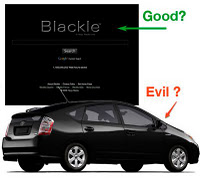 Black was the center of two disputes about its eco-friendliness. In one black was perhaps good; in the other, bad. You can be the color judge.
Black was the center of two disputes about its eco-friendliness. In one black was perhaps good; in the other, bad. You can be the color judge.
Good Black
The first case was Google’s "Blackle" - an alternative to Google's white page - that would save 3000MWh per year. Others claimed that "While it may be true that a CRT monitor uses 15 watts less with the black screen, only 25% of the world's monitors are CRT." Some others put this to a test of 27 monitors ("The Final Test") and found that LCD monitors with a size 22-inches or less, all showed an increase in power consumption using Blackle. Beyond the 22-inch mark however, five of the six models showed a fractional decrease in power consumption when using Blackle.
Btw, there are proven ways to save power with your computer.
See "Tips" at http://techlogg.com/content/view/367/
Bad Black
A regulation to ban black cars - to reduce the energy requirements to cool them - was considered by the California legislature. However, a report states,"The problem isn't the color per se, but the reflectivity of the paint overall. And dark colors just don't reflect well, so they are likely out."
Note: Potential approaches include reformulation of paint to reflect near-infrared sunlight, parked car ventilation, and solar reflective window glazing. It is expected that cool paints, together with reflective glazing, will reduce the temperature of a typical vehicle parked in the sun by 5 to10 degrees celsius. Source

